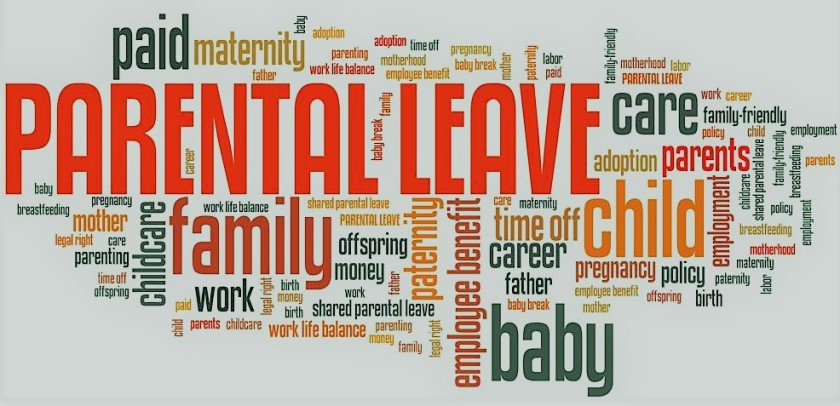A cultural shift is happening! What it means to be a father has changed a lot over the years. Some say that the E.R.A., also known as the Equal Rights Amendment, shouldn’t be part of the U.S. Constitution and that most Americans disfavor it, or that men are conditioned to be breadwinners. Others have said that most employers can’t afford an additional financial burden, especially following the recent adoption of the health care reform or that the U.S. can’t afford paid parental leave for both parents. But through my research, I found this information to be misleading. Now that the male gender roles are dramatically changing, there are countless benefits of paternity leave, not just for the parental bond between dad and baby, but for the whole family.
Childbirth is a grueling process and it can really take a lot out of a new mother. Women are naturally, emotionally and physically drained after giving birth; they simply want to rest. Research shows that more support from the father can increase the mother’s well-being, therefore mothers are less likely to experience depression after childbirth. It’s important for men to receive paternity leave so that they can help with the rigorous routine that is now their new norm. With paternity leave, the men are given the privilege of being able to share in on the first stages of the child’s life. They also get the opportunity of simply just being there, to get to know them and learn their needs.

I believe that men should receive up to 2 weeks of paid paternity leave from work. When actress Anne Hathaway spoke before the United Nations on International Women’s Day last year, she stated that “1 in 4 American women go back to work after two weeks of giving birth, because they can’t afford to take any more time off.” By allowing fathers to take up to two weeks of parental leave, it would allow the mother to take the complete six weeks given under the law.
As a future HR leader, I have put a ton of time into researching this topic. Paternity leave, as opposed to maternity leave, is the time a father gets off work to bond with his infant or newly adopted child, and it’s still a highly controversial topic today. It’s good for everyone when both men and women take parental leave for having a child. It should be mandatory by employers with more than 50 employees, to each of the 50 states in the U.S.
Gender equality is still a work in progress in most countries around the world and it’s not just a female issue, it’s a business and economic issue as well. According to Benefits Magazine, “Many countries offer statutory parental leave to working parents. The most progressive countries offering more than a year of paid parental leave for the birth or adoption of a child include Estonia, Bulgaria, Hungary, and Japan. Parental leave policies should reduce gender discrimination in the workplace if both men and women are equally likely to take leave, thereby removing employers’ reluctance to hire women. Governments also have recognized that flexibility in the workplace can be an important tool to further enhance gender equality.”

By only giving leave to women, we are maintaining the ancient belief that women should be the homemakers and men should be the wage earner, therefore promoting sexism. Mandated equal parental leave will help transform the perception that caregiving is a female responsibility. A survey held in 2016, Beyond Your Father’s Briefcase, by Scott Behson, Ph.D., professor of management at Fairleigh Dickinson University and author of The Working Dad’s Survival Guide, states, “Fathers today view their role and priorities differently than how they viewed their father’s priorities when they were growing up. Interestingly, 1 in 3 working fathers spend more than 16 hours during the workweek with their children, more than half, 57%, don’t feel they spend enough time with them.”
Molly Mayer and Le B. Céline, Population Research and Policy Review (2019) state, “As fathers, with the help of paternity leave, increasingly occupy a presence in the home, it becomes easier for mothers to re-enter the labor market after childbirth. It is also believed that when men take the same length of parental leave as women, it will help make the labor market more gender-equal in terms of opportunities, as the “cost” of childbirth is distributed more equally among men and women.”

Working dads shouldn’t have to choose between their children and a paycheck. A newborn baby is a challenge, but when both parents share the responsibility, their partnership becomes even stronger and there’s less room for resentment in the future. According to Mathew C. Klein, Barron’s (Online, 2019), “Pushing men to spend more time with their children would, therefore, help both men and women. This is a collective action problem that requires a collective solution. If everyone takes time off, the career penalty for any individual worker disappears. Companies initially resisted giving workers eight-hour days, weekends, and holidays, but they eventually adapted. There is no reason they can’t also accommodate the needs of men and women having families. If mothers disproportionately take time off to raise children, women will continue to be permanently disadvantaged for spending long stretches out of the office while men get promoted and move up the ladder. This is obviously bad for women, but it is also bad for men—and business.”
Marie-Claude Lavoie, a doctoral student in epidemiology in the department of public health and epidemiology at the University of Maryland School of Medicine, says, “Some states, such as California and New Jersey, have addressed this concern and demonstrated leadership in tackling the financial sustainability of paid parental leave. In California, the legislation for paid family leave offers employees a maximum of six weeks of partial pay, to care for a newborn. Under the State Disability Insurance program, the benefits are covered through payroll taxes. In discussing costs, we must remember that there is also a cost associated with not providing paid maternity leave. For example, the cost of daycare might overshadow the mother’s salary, potentially leading a woman to leave her employment. Families may then have to seek government aid to help them recover from the loss of income. For companies, there are also economic burdens associated with failure to provide paid maternal leave, as it may affect staff retention and lead to lower productivity.”

To conclude whether men should be given paid paternity leave or not, still, and will continue to remain controversial. The more that men see other men taking parental leave, the more it will become the norm. In Ernst & Young’s global generational survey, 83% of American millennials said they would be more likely to join a company offering such benefits. Therefore, offering equal parental leave can help attract and retain top talent. A company’s parental leave policy should be inclusive for all and allow everyone to thrive in the workplace. Equality starts at home!
It’s clear that the call for paternity leave in the United States is growing. As more men have the courage to choose and become “Dadvocates,” businesses will reap the benefits of a more loyal, happier, and balanced workforce. Take advantage of the time off given to you. Show how well it works and be a pioneer in the workplace, and don’t’ give up. By making decisions that are best for family needs, it helps to build a coalition of like-minded individuals who share the same goal of making family leave happen at the workplace.



